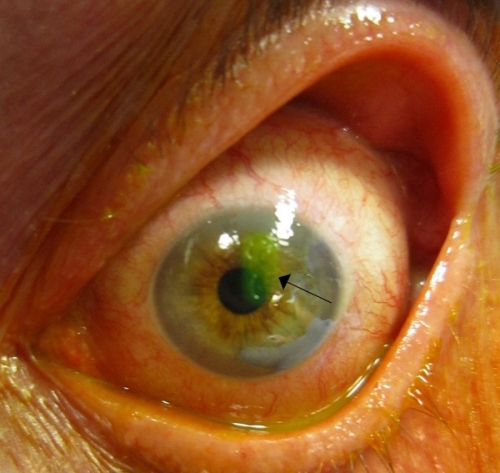The cornea is the transparent layer forming the front of the eye that transmits and focuses light into the eye. A corneal abrasion is a scratch to the surface of the cornea. Symptoms of a corneal abrasion and corneal laceration include redness, pain, light sensitivity, excessive squinting, and the feeling of a foreign body in the eye. With a corneal laceration, the pain will be more severe.
Corneal abrasions are typically caused by minor trauma to the eye and may occur with contact lens use when a fingernail scratches or pokes your eye, or if something like dirt, sand, or sawdust, or some other foreign body gets trapped under your eyelid. Corneal abrasions can also be caused by rubbing your eye too hard, wearing old contact lenses, and while participating in other everyday activities. About 25% of corneal abrasions occur at work.
A corneal laceration serious and is an actual cut on the cornea, typically caused by something either striking the eye with significant force or something flying into the eye.
The difference between an abrasion and laceration is that a corneal laceration is deeper than a corneal abrasion, cutting fully or partially through the cornea. A deep corneal laceration is known as a “full thickness laceration”. A full thickness laceration cuts completely through the cornea and causes a tear in the outer surface of the eyeball itself also known as a ruptured globe.
Corneal lacerations are typically caused by cutting wood, trimming grass, grinding metal or other similar activities – the edge of a piece of paper can cut through the cornea if enough force is involved, and can usually be prevented by wearing protective eye wear.
If you believe you have a corneal laceration, you should seek immediate medical attention to avoid vision loss. In addition, take the following steps to prevent further injury to your eye:
- Carefully and gently place a shied over the injured eye
- Do not rinse your eye with water
- If there is an object stuck in your eye, do not attempt to remove it
- Do not rub or apply pressure to the eye
- Avoid taking or giving ibuprofen, aspirin or other non-steroidal, anti-inflammatory drugs and these drugs will thin the blood and may increase bleeding.
- See a physician immediately once you have finished protecting the eye.
Treatment for corneal lacerations usually require surgery to prevent further damage to the eye and to remove any foreign object remaining in the eye, and to prevent vision loss.
Image by: James Heilman, MD (Own work) [CC BY-SA 3.0 (http://creativecommons.org/licenses/by-sa/3.0) or GFDL (http://www.gnu.org/copyleft/fdl.html)], via Wikimedia Commons






